- Home
- Stacia Kane
Unholy Ghosts Page 31
Unholy Ghosts Read online
Page 31
The very thought made her skin crawl. “No, thanks. I’m fine, really. I’m sure the Black Squad will be able to catch them.” Actually, she wasn’t at all sure, but this was her home they were talking about. “I’d like to stay where I am.”
His bright head dipped. “As you wish.”
“Thanks.”
Silence fell between them. Chess wondered if she should get up, if they were done. But Elder Griffin didn’t seem done. He watched her, smiling.
“In truth, I’m not the only one who’s proud. The Elders had a discussion this morn, about what you did. We are very pleased.”
“Thanks.” She was starting to feel like a broken record. The story she’d told them had been a simple one: The Lamaru recruited Randy and in return for his help they’d put Ereshdiran into the Morton home. No mention of the airport, or Slipknot, or the blood connection between herself and the thief. She would have left the Lamaru out of it entirely had she not asked Doyle about them the day before. The Mortons surely wouldn’t have mentioned them, if they even knew the full scope of the plot; Chess hadn’t heard any of their testimonies yet. She only knew they were alive and awake and somewhere in a detention cell.
Elder Griffin reached into the file on the long, shiny glass table and pulled out an envelope and two sheets of paper, which he handed to her.
The paper was official Church stationery. The first sheet was a letter of commendation. The second … She had to read it twice before the words meant something.
“Technically it’s not a promotion,” Elder Griffin said. “You will still be a Debunker. You’ll just occasionally be helping other departments with their investigations. For a bonus each time, of course.”
The irony made her want to laugh, in a sick, cynical way. She’d lied to everyone, and she was being rewarded for it. Seemed to be the way her life was working these days, though, what with the free pills in her bag from Lex and the erased debt from Bump. For however long that lasted.
She set the letter on the table and opened the envelope, then looked up. “You gave me my bonus already, remember? Before the meeting?”
“This is in addition to that. We felt something was called for, for defeating the Lamaru plot.”
It wasn’t much. But it would cover the new bed she’d bought, and a week or two’s worth of food. Or a nice long weekend in the pipe room …
Her head still spinning, she thanked Elder Griffin again and headed out of the building, into the soft autumn sunshine.
Doyle waited for her by her car. His face was full of colorful bruises, like he’d been painting and made a mess. “Hey, Chessie, you got a minute?”
“Not really.”
“Please.” He reached for her, caught himself and shoved his hand into his pocket. His left one dangled by his side, the pinky splinted and wrapped. She almost wished she could feel guilty about it. “I just wanted to say sorry. For … what I did. I honestly didn’t mean to. I just … you know, you treated me pretty shitty.”
“Uh-huh. Well, thanks for the apology. I have to go now.”
“Can’t we just talk about it?”
“Nope.” She needed new tires. Hell, she needed a new car. Maybe now she’d get one, if she found one she liked. The bonus for Banishing Ereshdiran hadn’t been as much as she’d hoped, but it was enough, especially since she could cut down on her purchases from Bump—at least for a little while, until Slobag and Lex decided she’d been paid enough and cut her off.
And really, she should spend the money now, while she had it, before she got too itchy and blew it on beer or the pipes or whatever else she could get her hands on.
“I’m not a bad person, you know,” Doyle said.
“Hey there, tulip. Who’s your friend?”
Chess turned around and swallowed her surprise. Lex. She hadn’t seen him or heard from him in three days, since the morning after the airport showdown, and she wasn’t sure if she was relieved or sad about that. A bit of both, really, but it was nice to see him just the same.
Lex stared at Doyle, his eyes narrowing.
Shit. Even she couldn’t be that mean, could she? Terrible had already more than taken care of whatever residual anger she felt toward Doyle.
“Just a guy I work with,” she said.
“I have a name, you know.” He glared at her. “I’m Doyle.”
Lex grinned. “You Doyle, aye? Guessing you just the guy I been lookin for, then.”
Chess lit a cigarette and turned her back on them as Doyle started to run. She didn’t need to watch, any more than she needed to think of the future. Instead she looked at the Church, rising from the earth like a plume of pure white smoke, gazing at her with benevolent detachment. She thought of the City, of the dead, empty souls milling around, waiting for their week of freedom, separated from her by hundreds of feet of solid earth. Where they belonged.
And for the first time she believed there might be a place where she belonged, too, outside of the Church and her position there. And maybe one day she’d have the strength or the courage to accept it. For now …
She ground out her smoke with her toe, and went to find Lex. She had a whole empty afternoon in front of her, and a tattoo that was desperate for some air.
Acknowledgments
So many people to thank. I dedicated it to Cori, for being the first and best reader, but she wasn’t the only early reader; my great friends Stacey Jay, Caitlin Kittredge, and Mark Henry were invaluable. I can trace my friendship with Caitlin right back to the early stages of this book, and if nothing else, it would be special to me for that. Great big thanks and love go to my wonderful husband, Stephen, who continues to put up with me; my two daughters who try very hard to be good while Mommy works; and my father and brother. Special mention to my mom, the registered nurse, who thankfully is used to questions like, “So, if I inject motor oil, would that kill me right away?” and doesn’t bat an eye. I also have to thank my agent, Chris Lotts, who is awesome and loves shortbread. You wouldn’t be holding this book in your hands if not for him and for Liz Scheier, who acquired the series and edited the first two books; working with Liz was an absolute dream. Huge thanks also to my wonderful new editor, Shauna Summers, and to her fantastic assistant, Jessica Sebor, and to everyone at Del Rey; I cannot say enough how great they all are and how welcome and valued they have all made me feel.
All of Team Seattle deserves enormous, drunken, mushy appreciation, especially Jaye Wells, Richelle Mead, and Jackie Kessler (a fellow Satellite member). Kaz Mahoney, Synde Korman, Todd Thomas, Jill Myles, Seeley DeBorn, Kirsten Saell, Bernita Harris, Bernard DeLeo, Jane Smith, Colleen Lindsay, Briana St. James, Justin Coker, Derrick Beasley, Tom Gallier, Fae Sutherland, and Derek Tatum all deserve extra thanks for being my friends and making me laugh; if your name isn’t here it’s because I’m the terrible friend, not you. All of my fellow Reluctant Adults. Jessica Wade and Jim McCarthy. Paul Goat Allen, Rachel Smith, Lisa Trevethan, Kimberly Swan, and Mrs. Giggles. And of course, thanks to Evil Editor and the Minions, Miss Snark and the Snarklings, and all of my blog readers, Facebook pals, and Twitter followers; seriously, it may not seem like a big deal, but when you spend all your time alone with a computer and your own misery and neuroses, knowing there are other people out there really does make a difference. I continue to be amazed that anyone pays any attention to anything I say.
Huge, special thanks go to all of the bands I mention in this book. My life would be very different and a lot worse without your music.
Last of all, thanks to you, the reader holding this book. You’re the reason for all of this. I hope I don’t let you down.
Read on for an excerpt from Stacia Kane’s
Unholy Magic
Chapter One
The penalty for summoning the dead back to earth is death; if the summoned spirit does not kill its summoner, be assured the Church will.
—The Book of Truth, Laws, Article 3
Ghosts were stronger underground; no witch willingly went below the sur
face of the earth, not without a Church edict or a death wish. Chess had both to varying degrees, but that didn’t make the doorway looming behind the skinny man holding the cup any more appealing. The doorway, and the stairs. Down into a basement, down into the ground.
Chess’s skin crawled from more than just the squat-faced, wizened appearance of the man, more than the bizarre energy in the dirty shack. Something told her this was not going to end well.
But then, things so rarely did.
She could have busted the bastards simply for having a basement. The Church decreed they were illegal, and the Church was not to be disobeyed. But she needed more than that—a month of investigation demanded a more satisfactory resolution than that—so instead she pasted what she hoped was a smile with the right touch of nervousness on her face and handed the skinny man the picture she’d brought, careful not to touch his grimy fingers.
The picture was of Gary Anderson, a fellow Debunker, but the skinny man didn’t know that. At least Chess hoped he didn’t.
“My brother,” she told him. It would have been better if she’d been able to squeeze out a tear, but the Cepts she’d taken didn’t allow it. It was hard enough to feel emotions when she was high, let alone emotions intense enough to make her weep. Hell, that was one reason why she kept taking the fucking things, wasn’t it?
The skinny man focused his rheumy eyes with effort on the photo, then nodded.
“Aye, seein a lookalike,” he mumbled, scratching his bony chest through a hole in his ragged green sweater. He shoved the cup forward, narrowly avoiding hitting her with it. “You drink, aye?”
“Thanks, but—”
“Nay, nay, lil miss. You drink, or you ain’t get down, aye? All must drink.” His chapped lips stretched and flaked in a gruesome semblance of a smile, like a fat worm crawling across his face, revealing broken, graying teeth. “All must drink, or the energy, she ain’t work.”
Shit. Who the fuck knew what was in that nasty cup? Even if the “tea” was harmless—which she doubted—the thing looked like it hadn’t been washed since before Haunted Week. She could practically see germs crawling along the rim.
The bonus on this job would be a couple of grand, she reminded herself, and snatched the cup from his dry, bony hand.
His gaze locked on hers. She held it while she tilted the cup and poured the contents down her throat.
For a second the room spun around her, whirling on its side like an amusement park ride. The concoction tasted of bitter herbs and glue, of seawater and sewage. It was the most revolting thing she’d ever put in her mouth, and that was saying a lot.
She held it down through sheer force of will, and was rewarded with another flaky smile. Something lurked behind that smile, but she didn’t have time to analyze it. His hand was on her sleeve, urging her into the dark mouth of the stairway, and her feet clumped on the wooden slats as she made her way into the damp cave below.
The others were already there, sitting in a circle beneath flaming torches, around a scarred wooden table. Across one end of it was draped a blue silk scarf, stained with blood or wine—or perhaps someone else’s stomach had lost its battle with the tea.
No time to think about it, even if she’d cared to. Instead she made her way to the table, to the straight-backed wooden chair someone had pushed out for her.
“Someone,” she saw, was a five-foot-tall human parody of indeterminate sex wearing a belted garbage bag and white face paint. Heavy black rims surrounded its beady, pupilless eyes, and its voice was barely more than a dry whisper, like a knife cutting through cardboard.
“Sit ye down, lil miss,” it rasped. “Sit ye down, and the Ladywitch, she’ll be out.”
“The Ladywitch” was Madame Lupita, formerly known as Irene Lowe, and as soon as Chess had the evidence she needed—in the form of her own eyewitness testimony and whatever the minirecorder concealed in her bra picked up—Madame would have a date with a guillotine. The Church did not take a forgiving stance on illegal ghost-raising or séances, even fake ones such as Lupita was rumored to run.
Rumor, hell. What was about to happen here was obvious, was even more so when a black-painted door opened opposite Chess and an enormous woman thrust her bulk into the room.
Her face was white, her eyes black-ringed, a garish parody of Church Elder makeup. Any resemblance stopped there. Madame Lupita wore a shiny silver caftan, on which were painted various runes and magical symbols. Small pieces of iron hung from it, too small to offer any real protection. Chess supposed they were there for effect, as was the heavy iron-and-amber necklace around the woman’s short, fat throat or the matching silver turban covering her head.
Whatever they were for, Lupita’s appearance was obviously what the other people around the table expected. Chess felt rather than heard their sigh of satisfaction, their belief that they’d done the right thing in coming here. For those who couldn’t afford to pay a Church Liaiser to contact the spirits of their dead loved ones, amateur séances like these seemed the answer to the prayers they were prohibited from uttering.
Too bad they were illegal, which was why Chess was there to begin with. Helping the Black Squad make a case against Lupita meant some extra cash for her.
And too bad it was all fake. If Lupita and her ilk were truly powerful enough to raise ghosts, the Church would have found them through the tests every child in the world underwent at the age of fourteen, would have trained them and hired them. Many of them had a glimmer of power, enough to send a shiver through the air and fool their clients, most of whom had no idea what real power, real magic, felt like.
Chess did. Knew the feeling—loved the feeling—almost as much as the cool, smooth peace of her pills, or the foggy bliss of Dream smoke, or the sparkly, fizzing sensation created by the occasional line of speed. She knew them all, loved them all, because anything that distanced her from reality was a blessing in a world where blessing was against the law.
Of course, her drugs were illegal, too. But that hadn’t stopped her from doing them, hadn’t stopped her dealer, Bump—or her whatever-he-was, Lex—from selling them. It just meant they all had to be a lot more careful.
Speaking of careful … Madame Lupita settled herself at the table, clapped her hands. Something clinked behind Chess. She didn’t turn around, but she heard it, soft wings beating the air. A psychopomp. Madame Lupita knew how to put on a show.
“All hold hands,” she commanded, in a deep, liquid voice. “No messin, aye … hold hands, or they don’t come.”
To Chess’s left sat a rake-thin young man. His fingers were sweaty, his face wet with tears as he stared at the picture on the table before him. Chess couldn’t make out the image.
To her right was the female half of a middle-aged couple, clad in a cheap fake silk dress. Her hand shook against Chess’s palm.
Lupita reached across the table and grabbed the picture in front of the woman. “What be this girl’s name?”
“A-Annabeth. Annabeth Whitman.”
Lupita bowed her head. The others did the same, including Chess, who used the opportunity to look around the room from under her lashes.
The psychopomp settled on a perch behind Lupita’s left shoulder. A crow, its black feathers gleaming in the firelight. To Chess’s right, against the wall, row upon row of skulls grinned blankly at her. Most were small animals, cats and rats and the occasional dog. To her left a wall mural; spirits straining for the sky, their long arms and spidery fingers gruesome and sad.
Sweat beaded on her forehead and trickled down the side of her face. Had it been that hot in there a few minutes before? No one else seemed to be sweating, why was she?
Of course, no one else was wearing a high-necked, long-sleeved sweater, either, despite the cold outside. Chess had no choice; every inch of her arms and chest was decorated with the tattoos marking her as a Church employee, magical symbols that focused her power, warned her, protected her. They tingled now, but whether it was from the heat or her nerves or the trem
ors in the atmosphere, Chess didn’t know. It was nothing serious. She’d been right. Lupita didn’t have anywhere near the kind of power required to raise a ghost.
Good thing, too, as she hadn’t even bothered to mark her “guests” with basic protective sigils or circle the floor with salt or anything else Church employees learned in their first year of training.
Chess wondered what they might see. Holograms, probably; their technology had advanced to the point where it was difficult or impossible to tell the difference between a real ghost and a fake one—at least if you didn’t have any natural abilities in that direction—and if Lupita brought in this kind of money on a regular basis, she could probably afford the top of the line.
Or it could be some of the old-fashioned tricks, the kind used by charlatans long before Haunted Week. Dim lighting, the bizarre and disgusting tea that was probably mildly hallucinogenic, the power of suggestion. Mirrors and shimmery fabric and the customer’s own desperate need to believe would take care of the rest.
At least it was safe. A real ghost—a real ghost was something to inspire nightmares. A real ghost, outside of Church control, wasn’t going to have a nice little chat with its mommy or beloved friend. A real ghost was going to have one thing on what remained of its mind, and one thing only: to kill. To steal the energy of everyone it came near, to use its life-force to make itself stronger, a parasite that would grow fat on the blood of its victims.
Not one of the people in that room had any fucking idea what it meant to face a real ghost. Lucky for them, they weren’t going to find out, either. As soon as Lupita got her little show on the road they could shut her down, and the closest they’d get to a ghost was that hideous mural.
Orange light flashed off silver. Chess looked up along with everyone else, and her already nervous heartbeat kicked into high gear. Madame Lupita held a knife, high over her own exposed forearm. Blood magic. Oh, that was not good. Blood magic, with no circle, no words of protection. Lupita might be powerless, but this was—

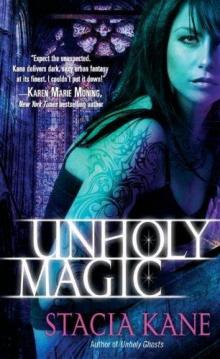 Unholy Magic
Unholy Magic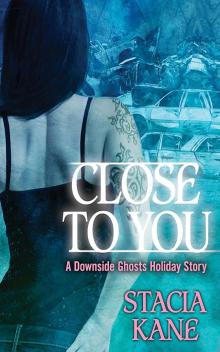 Close to You
Close to You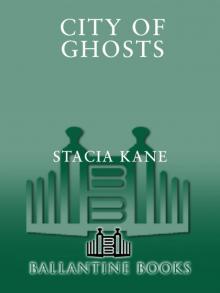 City of Ghosts
City of Ghosts Home
Home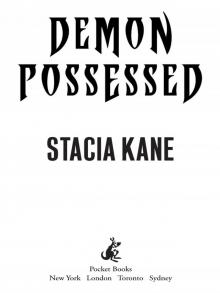 Demon Possessed
Demon Possessed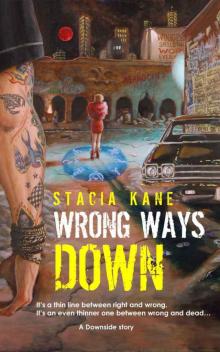 Wrong Ways Down
Wrong Ways Down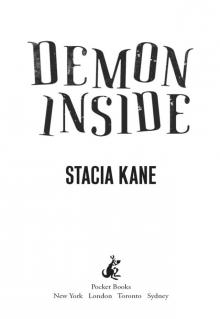 Demon Inside
Demon Inside Unholy Ghosts
Unholy Ghosts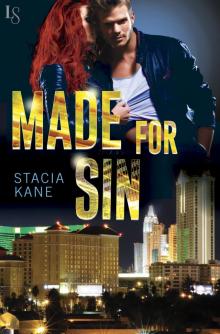 Made for Sin
Made for Sin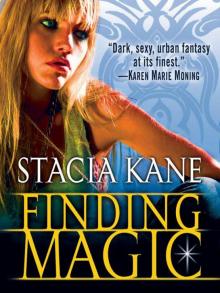 Finding Magic
Finding Magic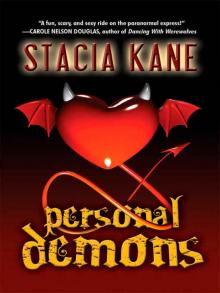 Personal Demons
Personal Demons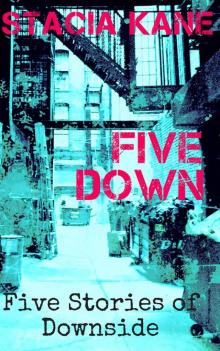 Five Down
Five Down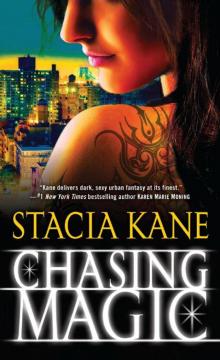 Chasing Magic
Chasing Magic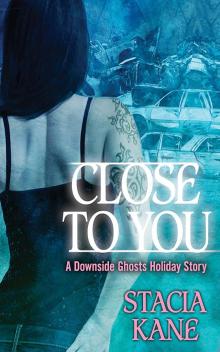 Close to You (downside ghosts )
Close to You (downside ghosts )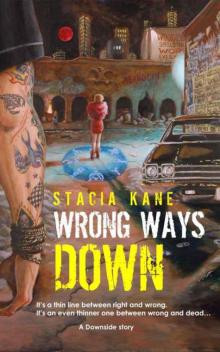 Wrong Ways Down (downside ghosts)
Wrong Ways Down (downside ghosts)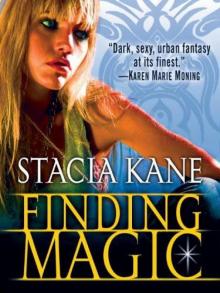 Finding Magic (downside ghosts)
Finding Magic (downside ghosts)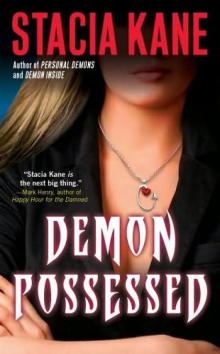 Demon Possessed mc-3
Demon Possessed mc-3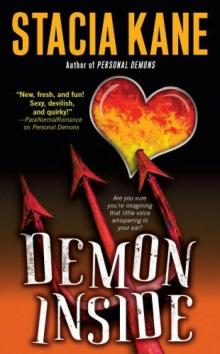 Personal Demons mc-2
Personal Demons mc-2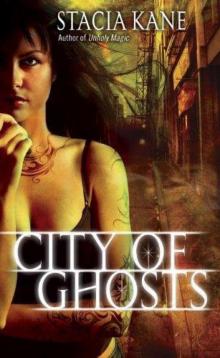 City of Ghosts dg-3
City of Ghosts dg-3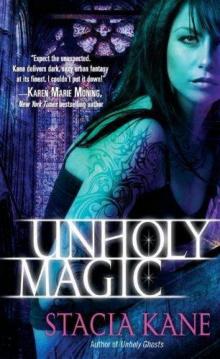 Unholy Magic dg-2
Unholy Magic dg-2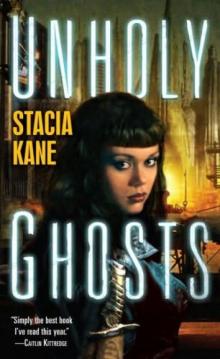 Unholy Ghosts dg-1
Unholy Ghosts dg-1 Home (downside ghosts )
Home (downside ghosts )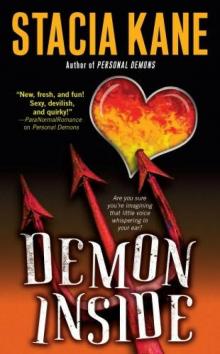 Demon Inside mc-2
Demon Inside mc-2